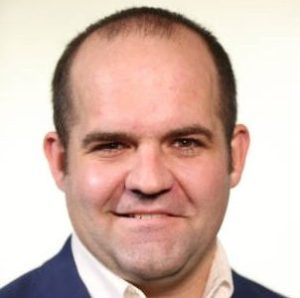
Dec. 28, 2016
Elizabeth King
My research is focused on understanding the genetic basis and evolution of organismal allocation patterns. The core life processes for every organism, such as surviving in the environment, finding food and mates, and reproducing, require the organism to allocate some of its limited resources to these functions. Different selective pressures have produced the diversity of strategies that we see within and among species in how and when to allocate resources to different structures and functions. I use both computational and empirical techniques to try to understand both how different allocation strategies evolve and the underlying genetic architecture of this highly…

Dec. 28, 2016
Guilherme DeSouza
Guilherme DeSouza is an associate professor in the Electrical and Computer Engineering Department, an adjunct associate professor in the Computer Science Department and a joint courtesy associate professor with the Sinclair School of Nursing, all at the University of Missouri. Winner of Purdue’s Honeywell Teaching Award, the Purdue’s Maria Canto Neuberger Research Award and the MU Excellence in Teaching Award, DeSouza come to Missouri after working as a principal research scientist at Purdue University and as a Senior Lecturer at the University of Western Australia. He also worked for over 10 years at the Brazilian Power Systems Research center on…

Dec. 28, 2016
Jeannette Jackson-Thompson
I have the expertise, training, experience and motivation needed for the proposed project. My training is in anthropological linguistics, public health and medical anthropology, with specific training and expertise in survey research/surveillance, questionnaire design and epidemiology. I have a broad background in chronic disease prevention and control and a significant record of accomplishment in program implementation and administration in the private sector, in the public sector and in an academic setting. My research interests include cancer etiology, disparity reduction, quality of life and data quality, including the use of electronic health records to improve data quality and completeness. I have…

Dec. 28, 2016
Christine Elsik
Christine Elsik’s research expertise is in computational biology and bioinformatics, and she works specifically in genome sequencing and annotation. She has worked extensively with genomes of cattle and a number of insect species. Chris will have a joint appointment between Animal and Plant Sciences and will be located in the Animal Science Research Center. She will have responsibilities in developing a collaborative research program in genomics, advising graduate students and teaching bioinformatics or computational biology.

Dec. 28, 2016
Jeffrey Bryan
Dr. Bryan’s research focuses on comparative examination of cancers in companion animals to better understand cancers in all species. Bryan is an associate professor of veterinary oncology and director of the Comparative Oncology and Epigenetics Laboratory. His particular areas of interest are targeted imaging and therapy and epigenetics of cancer. Targeted imaging and therapy agents take advantage of particular properties of cancer to deliver an imaging or therapy payload to tumors. Bryan is leading research projects studying an immunotherapy agent targeted to the low-oxygen environment of cancer, an herbal derivative that targets iron in tumors, and a nanoparticle chemotherapy targeted…

Dec. 28, 2016
Hong He
Issues of biodiversity, conservation, and ecosystem management increasingly need to be addressed at large spatial and temporal scales. Our research in landscape ecology puts ecological questions in such large spatial and temporal contexts. Our research in geographic information sciences explores new technical advances to help process and analyze large spatial data. We endeavor to advance the science and technology to solve regional planning, management, conservation, and restoration problems.

Dec. 28, 2016
Lori Popejoy
My professional nursing career has spanned about 30 years. In my early practice I worked primarily in intensive care nursing. The majority of that time I was in mid-level management. During my mid-career, I worked primarily in the nursing home setting as a study coordinator for several large nursing home research projects. From there, I reentered the management role as the Director of Nursing for Sinclair Home Care, which was the practice site for a study about aging in place. My work experience, which has included hospitals, nursing homes, and home health, has great depth and has inspired me to…

Dec. 28, 2016
Jared Decker
Genomics provides us with an opportunity to tackle questions that previously we did not have adequate tools to address. I use genomic data in multiple ways, from improving genome assemblies, to identifying causal variants, to investigating the genetic history of species.

Dec. 28, 2016
Prasad Calyam
Prasad Calyam is the Greg L. Gilliom Professor of Cybersecurity in the Department of Electrical Engineering and Computer Science at University of Missouri-Columbia, and Director of the Center for Cyber Education, Research and Infrastructure (Mizzou CERI). His research and development areas of interest include: Cloud Computing, Machine Learning, Artificial Intelligence, Cyber Security, and Advanced Cyberinfrastructure. He has published over 200 peer-reviewed papers in various conference and journal venues. As the Principal Investigator, he has successfully led teams of graduate, undergraduate and postdoctoral fellows in Federal, State, University and Industry sponsored R&D projects totaling over $39 Million. His research sponsors include:…